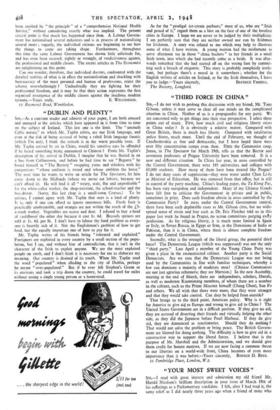" THIRD FORCE IN CHINA "
SIR,—I do not wish to prolong this discussion with my friend, Mr. Tony Gibson, unless it may serve to clear all our minds on the complicated situation in China. Neither of us is a propagandist for any party. We are concerned only to get things into their true perspective. I select three points out of many. First, how much civil and religious liberty exists in China today ? It is obviously a relative matter. Compared with Great Britain, there is much less liberty. Compared with totalitarian police States, much more. Until the end of February, we thought of Czechoslovakia as free and democratic, but I have heard there Were over fifty concentration camps even then. Since the dunmunist 'coup, Janus, in The Spectator for March 19th, tells us that the Rector and seventeen professors of Prague University have been removed. It is a new and different situation. In China last year, in areas controlled by the Central Government, there were 185 universities and colleges with 83,000 students. How many of them have been treated like Prague? I do not deny cases of suppression—they were worst under Chen Li-fu as Minister of Education. He was removed from that office, but is still in control of the party machine. China's leading paper, the Ta Kung Pao, has been very outspoken and independent. Many 'Of my Chinese friends have felt free to criticise the Government in private and in public, sometimes in print. Does such freedom obtain in areas controlled by the Communist Party? In areas under the Central Government control, there have been such deplorable cases as Mr. Gibson cites, but no wide- spread sense of strain and fear such as Dr. Eric Fletcher told us in this paper last week he found in Prague, no action committees purging ev‘ty profession. As for religious liberty, it is much more limited in Spain or Italy, in Soviet Russia, in Egypt or Iran, in the Dominions of India or Pakistan, than it is in China, where there is almost complete freedom under the Central Government.
Secondly, what is the strength of the liberal group, the potential third force? The Democratic League (which was suppressed) was not the only " third party." Last April a member of the Young China Party was given a place in the reconstructed cabinet. Another party is the Social Democrats. Are we sure that the Democratic League was not being used by the Comniunists in line with familiar techniques, whereby a few can dominate a majority of moderate men? (Chinese Communists are not just agrarian reformers; they are Marxists.) In the new Asiembly, meeting at the end of March, there are independents, scholars, liberals, as well as moderate Kuomintang members, of whom there are a number in the cabinet, such as the Prime Minister himself (Chang Chun), Sun Fo and others. We all wish that there were more, that they were stronger and that they would take control. Can they be helped from outside?
That brings us to the third point, American policy. Why is it right for America to give aid.to Europe and wrong to give aid to China ? The United States Government, are in a difficult position. If they give no aid, they are accused of deserting their friends and virtually helping the other side, as they did the Japanese before Pearl Harbour. If they do give aid, they are denounced as reactionaries. Should they do nothing ? That would not solve the problem or bring peace. The British Govern- ment are blamed for doing nothing. The difficulty is how to give aid in a constructive way to support the liberal forces. I believe that is the purpose of Mr. Marshall and the Administration, and we should give them credit for honest motives. If -we are now facing a common threat to our liberties on a world-wide front, China becomes of even more importance than it was before.—Yours sincerely, RONALD D. REES.
iz Pembridge Place, London, W.2.






























 Previous page
Previous page